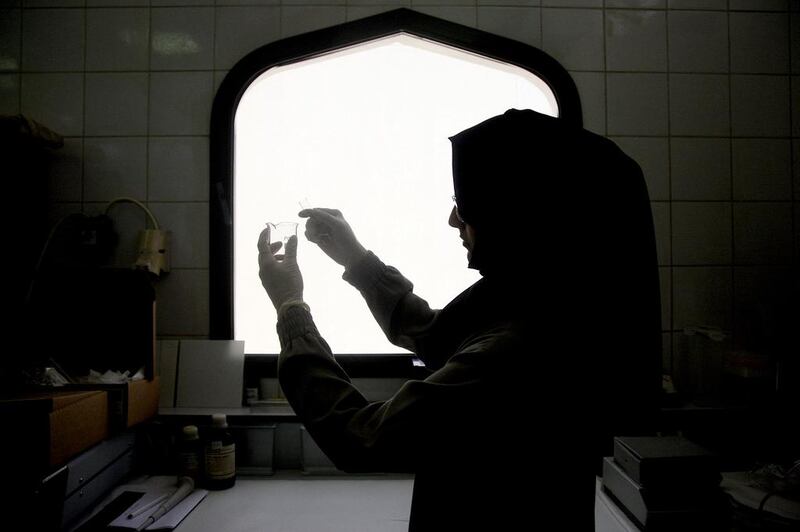Ever since she was a small child, Emirati Roudha Bint Butti bin Bishr’s dream was to become a heart surgeon. After school, she had secured at place at a university in Germany to start her medical studies. But at the eleventh hour she changed her mind, opting instead for chemical engineering at the American University of Sharjah. This, of course, has taken her down a very different career path. She now works for Dubai Police as an assistant expert in the department of forensic science and criminology.
Studying chemical engineering was tough and Ms bin Bishr wanted an equally difficult job. She was also strategic in her choice of roles.
“I tried to look for places where women needed more representation in the workforce,” she says. “So I chose the Dubai Police and specifically forensic science. It’s a challenging job and I like that. I am very passionate about my work.”
On joining the department, the young graduate spent a month rotating around the various other units – toxicology, biology, documents, firearms and fingerprints – before settling into the chemistry unit.
As is typical among graduates, Ms bin Bishr realised on leaving university that while she may be book smart, she still had a lot of on-the-job learning to do.
“Yes, I had all the knowledge from university but working life is really different – it’s really specific,” she explains. “So I had to build up skills and new knowledge and learnt how to apply this knowledge.”
She spent a few months learning by observing her more experienced colleagues as they worked their cases. She also continued to read, using both books and the internet. Eventually, she started participating in cases under senior supervision. Since she started work in 2011, Ms bin Bishr has been involved in 200 cases.
“We do one case at a time because we need the results to be accurate,” she says. “We wouldn’t want to get the samples mixed so we work one case at a time and finish that before starting with another case.”
One of her most interesting jobs concerned the classification of a new kind of synthetic drug – with the street name “spice” – within the legal system. Because these drugs are new, they have to be analysed for their components, which are then included in the national drug laws.
“We all worked together in the chemistry section along with the toxicology and the anti-drug department to put these compounds into the law so anyone in possession of the drug will be punished,” she says.
She started working on this at the end of 2011 and in mid-2012, the newly discovered compounds were included in the drug law.
“This was one of our biggest accomplishments in 2012,” she says.
The 24-year-old was recently struck by the huge responsibility her job brings. She went to court to watch one of her senior colleagues testify. The department usually sends written reports to court but occasionally the judge will ask the expert to testify in person.
“The responsibly is with you to be very sure all your analysis is really clean, that there is no contamination,” she says. “Your work has to have your full attention. It’s really critical. If you make a mistake on a case the person could go to jail or [a guilty person could be judged] innocent.”
As she continues in her job, Ms bin Bishr plans to become an inorganic forensic expert, meaning she will do analysis of things such as fibres and paint left at crime or accident scenes.
Already, her determination to be an outstanding specialist in her field has been recognised. Under her own initiative she created an electronic database for sample references; previously everything had been recorded on paper. She also made an electronic version of the UAE Federal Law 14 of 1995 setting out controlled substances.
She has also aced the various proficiency tests assistant experts are given. At the Dubai Police awards and the Dubai Government Excellence Programme awards she won in the category of new employee. She also won in the UAE-wide Ministry of Interior Excellence awards.
The moment Sheikh Saif bin Zayed Al Nahyan, Deputy Prime Minister and Minister of Interior, congratulated her on stage and told her to keep up the hard work is one she holds dear.
“It was the best moment,” she says.





